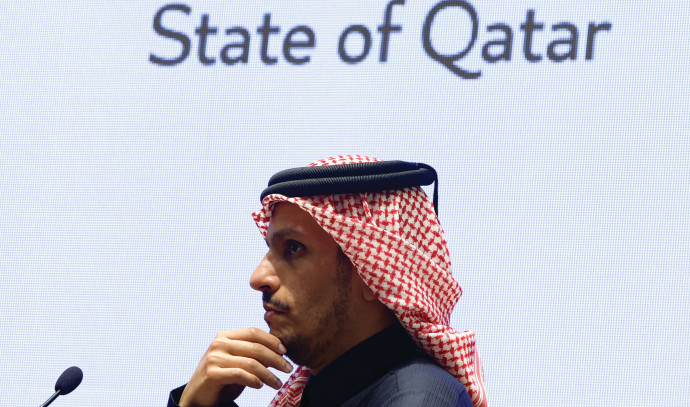In the wake of Jerusalem Post Editor-in-Chief Zvika Klein’s exclusive visit and meetings with a series of top officials in Qatar, there have been a number of counter-perspectives shared with the Post compared to what the Qataris told Klein.
These perspectives can be roughly divided into three categories: 1) those who see the Qataris as sometimes problematic but real potential allies; 2) those who see the Qataris as highly problematic, but as still critical interlocutors due to pragmatic realities; and 3) those who see the Qataris as a profound problem which must be cut off.
Former Mossad director Yossi Cohen roughly represents the first school of thought. He would candidly admit to having excellent personal relations with the Qataris, having gone “glamping” [glamorous desert camping] with their top officials, and told the Post this week that they have been and could be useful for regaining Israeli hostages from Hamas.
It would seem that Cohen also thinks that the current negotiations with Qatar could have had better outcomes if they had been handled more cleverly.
At the end of October, it was revealed that both current Mossad director David Barnea and his predecessor and former sponsor, Cohen, had visited Qatar to try to negotiate the hostages’ release.
Cohen: Netantahyu authorized Qatar visit
Criticized for his role on the issue, Cohen told the Post and publicly responded in other interviews that he was authorized by Netanyahu himself, and had met with Gal Hirsch, government coordinator for the captives and the missing.
Additional top diplomatic sources confirmed that Cohen had acted on the authority of the prime minister.
The second school of thought could be represented by Dr. Yoel Guzansky, a senior researcher at the Institute for National Security Studies, who also worked on Israel’s National Security Council on the Qatar file under three prime ministers.
He told the Post, “As long as there are kidnapped hostages, you don’t need to be a genius – dealing with Qatar is not a question of a privilege of yes or no.
“We need them,” he said, adding some colorful metaphors about how Qatar has Israel in a highly vulnerable position.
“With Al Jazeera, we are trying to push them into a corner… we are not trying to get rid of them, though also this I do not think is effective,” he stated, referring to a recent Israeli law that might lead the government to ending Al Jazeera operations in Israel.
In addition, Guzansky said, “We would be very happy if Qatar did not support Hamas and not do” all kinds of negative activities. “I also want world peace.” Right now none of these things are possible.”
Further, “after the hostages are freed, Israel can carry out a full revision of its relations with Qatar. It can carry out a deep probe into them and consult experts, with the National Security Council leading a policy review of a restart in relations with Qatar.
“But as long as there are hostages, what is the alternative?” he asked rhetorically.
“There were calls to declare Qatar an enemy, to attack Qatar, to kill the Hamas leaders in Qatar. This was foolish and caused damage,” said the former NSC official.
Next, he said, “We need to be patient and smart. Instead of being ‘right,’ we need to be smart. Qatar is a problem and will continue to be a problem. They are super significant to the US” because of their geographic location, where the US has its largest base in the world outside of the American continent; because of their diplomatic muscle; and because of their natural gas resources.
Qatar has also helped Washington with other negotiations. “They helped the US get out of Afghanistan. Qatar is also a facilitator of dialogue with Iran,” which has been a major issue for the US at times and may be again in the future. “Every bastard you want to speak to.”
Moreover, the “bargaining chips which the US has are large, but the US has a complex situation. Qatar is also the foreign country that buys the most weapons from the US…. Also, the Europeans are very deep into Qatar because of Russia” and the Russia-Ukraine War impact on the availability of natural gas for energy supplies.
He said China is also a big supporter of Qatar to maintain energy supplies, adding Qatar “is even more important now than it was” before the Russia war.
“One month after October 7, the US signed a deal to upgrade its base in Qatar,” he said, to hammer the point home.
“From this perspective, we [Israel] are not even in their league. A struggle against Qatar can cause damage. We want to start another front with another country right now – why?” in the middle of a multifront war when Israel’s international support has hit historic lows, he asked.
According to Guzansky, “Crushing Hamas is the best way to stop the relationship between Qatar and Hamas. If Hamas would be toppled, then there is no dilemma. They will need to drop out, or they will need to support the Palestinian Authority. They are very pragmatic and not ideological. They use Hamas as a tool.”
In contrast, he said, Turkey is more ideologically similar to and committed to Hamas.
“Let the UAE go into the vacuum. They are better than Qatar” and could replace it.
But so far “their [Qatar’s] support for Hamas has led to success with the US. [President Joe] Biden calls the emir of Qatar so many times and praises Qatar about how helpful they are.”
In addition, he said, “Hamas is not gone, so Qatar can keep the influence it wants. Hamas is weaker, but will continue to be an address in Gaza” because, so far, Israel has not succeeded in completely eliminating Hamas.
“Getting others into Gaza,” such as the UAE or the Saudis, “depends on crushing Hamas. If Hamas is not gone, then Qatar will continue to be the financial pipeline.”
Incidentally, although Barnea has close relations with top Qatari officials, he is probably closer to the Guzansky camp in his broader view of the Qataris.
The third school of thought would be represented by Dr. Jonathan Schanzer, senior vice president for research at the Foundation for Defense of Democracies.
According to Schanzer, “There was a major missed opportunity with this war to hold Qatar to account. This was the moment when Israel should have cut ties. The US should have forced changes in policy and should have forced the Qataris to remove Hamas.
“It should’ve been done, and they didn’t do it.”
Also, he said the US could have started “to address the [Qatari] terror financing problem, which we have ignored for too long.
“Instead, they became a partner to the US and, to a lesser extent, with the Israelis, to solve the hostage problem,” he recounted in frustration.
Next, he said, “They were successful initially,” with the November 23-30 hostage deal, but “they have failed multiple times since then.
“Is this truly a failure, or part of their strategy to string this along? That is accompanied by the question of whether Al Jazeera has been providing military support to Hamas in the form of relaying information gleaned by correspondents on the ground. We are aware of individual journalists who also double as Hamas fighters. All of these people are on the Qatari payroll,” said Schanzer.
Further, he said, “The biggest moment when the US failed was the decision to reengage the Qataris regarding the Al Udeid Air Base extension. They did this in the middle of the hostage negotiations, in the middle of a crisis.
“I would have said that the US will re-sign the agreement [for keeping the base in Qatar], but only after the return of the hostages. That would have been an excellent use of American leverage. Instead, the US gave the Qataris what they wanted and when they wanted it,” he lamented.
Moreover, he stated, “Israel themselves still appear to be in a fight between Yossi Cohen and Dadi [David] Barnea over who has the Qatari file. Israel is still treating the Qataris with respect. They covet the relationship with the Qataris. That needs to change.
“I don’t believe any of the underlying systemic problems have been fixed,” he warned.
In addition, he explained, “If I were making decisions for Israel or the US, I would end the Qatari negotiations channel now. I would force Hamas to work through other channels, possibly Egypt, maybe Europeans. There is no reason why another country can’t do this.
“Qatar presiding over this is insane. They are sponsors of Hamas; they are not dispassionate brokers. They have been funding Hamas at $30 million per month since 2018. They are not the people to trust right now, as Israel makes a last-ditch effort to get the hostages released before the battle of Rafah,” he declared.
“Hamas is just a small piece of the problem of Qatar,” Schanzer said. “They [Qatar] are sponsors of the Taliban. They provided support to operatives of al-Qaeda and ISIS. They are sponsors of the Muslim Brotherhood. They are an Islamist country, and they are as corrupt as any country I’ve seen.
“They bribed their way to buying the World Cup. They provide massive amounts of cash to the US and to European countries – this is the relationship that needs to be questioned, not just by Israel and the US, but around the world,” he said.
He cautioned, “They like to play the role of arsonist and firefighter. They create the problems and then claim to solve them.”







